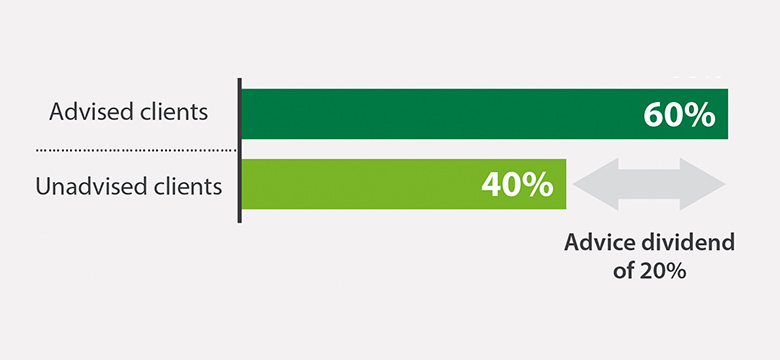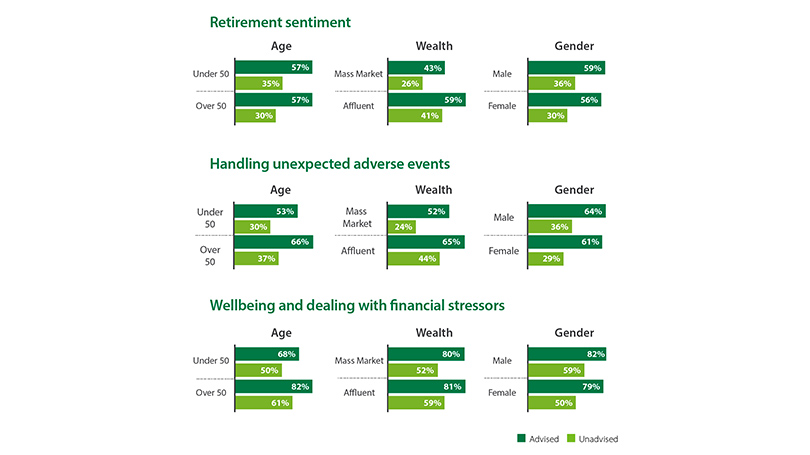The True Value of Advice
Research reveals an advice dividend
The research uncovered an advice dividend which represents the value advised clients derive from having comfort that their financial affairs are being managed by a professional adviser, as well as the tangible (financial) and intangible (wellbeing) outcomes this arrangement delivers.
The advice dividend is calculated as the difference in percentage points between the results of the advised clients and unadvised individuals. It exists where the response from the advised clients is greater than that of the unadvised individuals.

An advice deficit would exist where the response of advised clients was less than the unadvised individuals – the research did not uncover any advice deficits.
Our research shows that an advice dividend exists across age, wealth and gender in relation to retirement sentiment, handling unexpected or adverse events, overall wellbeing and dealing with financial stressors.
Key research findings of The True Value of Advice research paper include that:
- 90% of those with an adviser agreed that their adviser is a critical partner in their financial success
- More than nine out of 10 (93%) advised clients rated their financial adviser as very good or good with respect to the value of their services.
- 84% of advised clients agree the value of advice outweighs the costs
- 71% of clients found their adviser via a referral – highlighting the importance of relationships and word of mouth.
- 93% said they would likely recommend their financial adviser to family, friends, or colleagues
- The research revealed the key benefits clients experience from their advice, with it helping clients to identify, prioritise and achieve financial and personal goals, including that:
- 93% believe advice provides clarity around goals and progression towards them
- 91% agreed receiving advice helped them to achieve their financial goals
- 86% agreed advice helped them achieve personal goals
- 82% believe advice helps inspire them to work towards and reach their goals
- Almost half (46%) of unadvised individuals are open to the idea of seeking advice in the future, with 80% more likely to consider advice if they had a specific need identified
Measuring the benefit of financial advice

Barriers to advice
IOOF’s research reveals that many of the barriers to seeking advice are perceived rather than actual and are not reflected in the real-life experiences of individuals who have received advice. If those barriers could be overcome, the benefits of advice could be enjoyed by many more Australians that currently receive it[1].
The research identified those key barriers are being that those not currently seeking advice believe they do not have enough assets or wealth to need advice (61%); they do not believe it is the right time to seek advice (55%) or they do not think they can afford advice (54%).
The advice opportunity
The research findings reveal a clear opportunity for financial advisers, supported by well-resourced and forward-thinking Australian financial services licensees, to reach more Australians and deliver valuable financial advice.
1 In August 2019 the corporate regulator, the Australian Securities and Investments Commission (ASIC), said about 27 per cent of Australians had received financial advice in the past, and around 12 per cent had received it in the previous 12 months. ASIC said that despite the fact that more than two in five (41 per cent) of Australians said they intended to take up advice in future, “many of them will not proceed because of these perceived barriers”. Report 627: Financial advice: what consumers really think”, Australian Securities and Investments Commission, August 26, 2019.